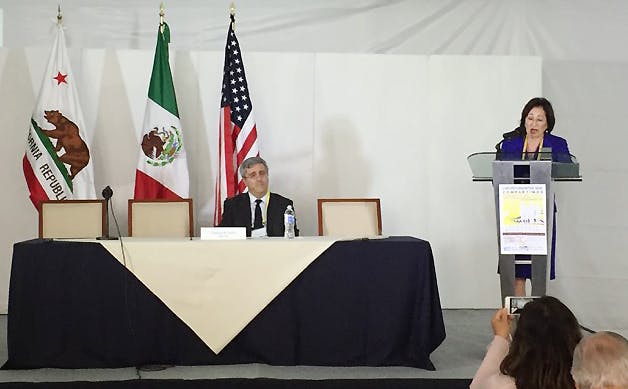The United States and Mexico share hundreds of thousands of students, but their educational needs too often go unmet and their potential is imperiled because of poor communication, bureaucratic challenges, language barriers and inadequate and unequal educational opportunities on both sides of the border.
That’s one of the conclusions of research conducted for “Students We Share” a bi-national research symposium in Mexico City hosted by the UC Mexico Initiative in collaboration with El Colegio de la Frontera Norte (COLEF), and other higher education institutions in Mexico.
According to research presented at the symposium, more than 400,000 U.S.-born school age children and their families are currently trying to find their way in Mexican schools. Students who return to Mexico and fail to enroll in school are not counted in these numbers but constitute a highly vulnerable group. Another 700,000 Mexican children in the U.S., as well as millions of U.S. citizen children of Mexican parents share parallel struggles in the United States.
“These students – bright, bilingual and bicultural – represent a tremendous asset for both of our countries, but too often they are caught in an educational no-man’s land where the struggles of school systems to communicate, needless bureaucratic requirements and language barriers undermine learning opportunities,” says Patricia Gándara, chair of the UC Mexico working group on education and a professor of education at UCLA. “We are working together to understand the issues confronting students and schools and improve learning opportunities in both countries.”
Gándara and other symposium organizers contend that not enough attention has been focused on the impact of incoherent immigration policies and almost totally uncoordinated education policies. These policies impact large numbers of students whose lives and education are divided by a border that separates not only families but different phases of young people’s education.
“The lack of coherent policy and communication is resulting in a massive loss of human talent, a loss of the very young people who could serve as bridges between the two nations and throughout the hemisphere,” adds Max Matus, a researcher at COLEF and co-coordinator of the symposium.
Researchers and policymakers gathered at the symposium to study the issues and develop public policy options for improving educational opportunities and the workforce development of Mexican-origin students in the United States and Mexico.
More information about the “Students We Share” symposium can be found on the new UCLA Knowledge That Matters website. Additional information, including summaries of research presented at the symposium can be found at the UC Mexico Initiative website.
